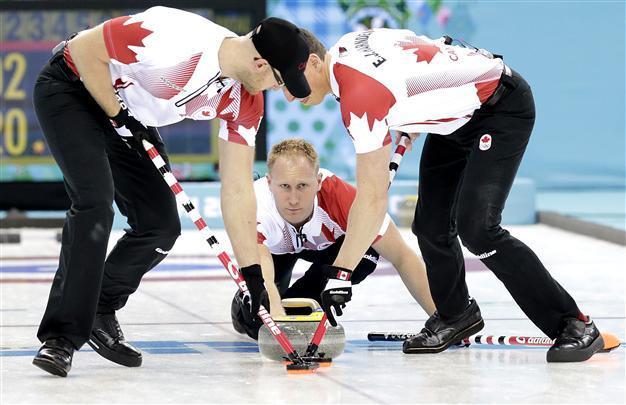The ‘roaring game’ adds to Sochi buzz as curlers hit ice
SOCHI – Reuters

Canada's skip Brad Jacobs, center, delivers the rock to his sweepers, Ryan Harnden, left, and E.J. Harnden, right, during the men's curling competition against Germany at the 2014 Winter Olympics, Monday, Feb. 10, 2014, in Sochi, Russia. AP Photo
The “roaring game” was finally heard yesterday when the curlers hit the ice at the Sochi Olympics, bringing their own, unique brand of excitement to the Winter Games.
While the downhillers and slopestylers have left spectators breathless with their daredevil antics high up in the Caucasus mountains, the curlers produce a different type of buzz as they sweep their way toward the two gold medals on offer on the edge of the Black Sea.
For the first time since curling was added to the Olympics program in 1998, curlers find themselves in the heart of the action.
They have been placed in the coastal cluster, alongside the other main venues and not banished to some Olympic outpost, adding another stamp of approval to a sport once dismissed as a pastime played at weekends by unfit men and women.
First played in medieval times on Scotland’s frozen lochs, curling is an ancient game that continues to struggle to find its place in a modern sporting world.
“It’s just perfect, it’s an incredible Olympic Games, the Olympic park, the conditions,” Britain skip David Murdoch told reporters after easing to a 7-4 opening win over Russia.
“It seems to have a cult following during the Olympic Games and one of the BBC guys told me that it is one of the most popular things to watch and that’s what we want.
I think we are on the ice for so long that people can become really involved and they get to see you on TV and start cheering you on.”
More quirky than hip, curling’s appeal partly lies in a rich, almost mythical, history.
Before the start of each and every session at a major competition curlers are led on to the ice by bagpipers. In Sochi, that honor was given to a pipe band from Moscow.
Most of the world’s curling stones, including those being used in the Olympics, have for a century been mined from one tiny rocky volcanic island off the Scottish coast, the “roaring game” getting its name from the “roar” the granite stone makes as it travels over the pebbled ice.
The other big part of curling’s unique charm is that the athletes competing for medals are, for the most part, true amateurs with full-time jobs who play for the love of their sport.
Perhaps nowhere in Sochi will the competition more embody the Olympic spirit than at the Ice Cube.
But do not mistake the good natured vibe for a lack of competitiveness, the world’s best curlers are as ruthless in their pursuit of gold as any speedskater or hockey player.
In curling quarters, Swedish world champion Niklas Edin is known as the sport’s John McEnroe, a fiery competitor capable of smashing his broom or unleashing profanities that would make the American grand slam winner blush.
The Swedish skip was not particularly pleased with his rink’s opening effort, a 7-5 win over Switzerland but kept his temper in check.
Action heated up quickly yesterday as the gold medal favorite Canada got off to an uneven start against Germany’s John Jahr scoring two in the final end to cement an 11-8 victory.
“I wouldn’t call it nail-biting, I would call it a learning experience,” said Jacobs. “A win is a win, we’ll take it.
“Very nice to get out there and get a game under our belts and get that feeling back about what it’s like to play in a big event.”
In Canada, they name highways and parks after their curling heroes, with names such as Eddie “The Wrench” Werenich and Schmirler “The Curler” becoming almost as familiar to Canadians as Sidney Crosby and Wayne Gretzky.
When Brad Gushue’s team took gold at the 2006 Turin Olympics the Newfoundland foursome returned home to a heroes’ welcome and the new Team Gushue Highway.
“Just go out there and do what we’re here for,” said Jacobs. “Every curler here will agree there is more pressure, here it creeps into the back of your mind how big this event is but you fight that as best you can and make it feel like any other tournament.”
